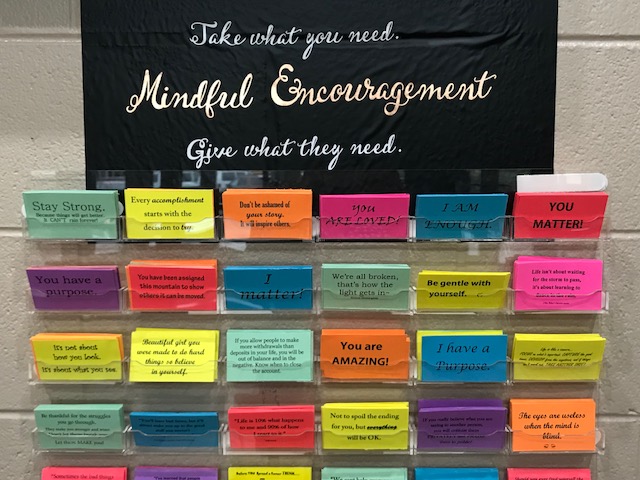High School News
Mindful Encouragement Initiative
Connect homerooms were created this year to foster connections between students and staff. This weekly 24 minute period is lead by Student Leaders who are supported by the Connect Homeroom Teacher. Together the student and teacher lead the lesson plan of the week. Lesson plans range from activities involving self awareness, goal setting and partner accountability, academic checks points involving conferences with homeroom teacher (going over transcripts, grade cards, and midterms), fun competitions, creative projects, prevention campaigns, careers, and character education.
Mindfulness Lessons being taught in high school Connect Homerooms
Each week students learn a new way to be more mindful. Mindful of the words they say to others and to self. Mindfulness improves the over all quality of life by striving to stay in the present moment. In a busy world it is difficult for all of us, but especially teens, to manage the expectations of everyday life without focusing on regrets of the past or worries about the future. So…the importance of teaching mindfulness is another essential tool we can teach kids at WHS.
Mindfulness improves well-being. Increasing your capacity for mindfulness supports many attitudes that contribute to a satisfied life. Being mindful makes it easier to savor the pleasures in life as they occur, helps you become fully engaged in activities, and creates a greater capacity to deal with adverse events. By focusing on the here and now, many people who practice mindfulness find that they are less likely to get caught up in worries about the future or regrets over the past, are less preoccupied with concerns about success and self-esteem, and are better able to form deep connections with others.
Mindfulness improves physical health. If greater well-being isn’t enough of an incentive, scientists have discovered that mindfulness techniques help improve physical health in a number of ways. Mindfulness can: help relieve stress, treat heart disease, lower blood pressure, reduce chronic pain, , improve sleep, and alleviate gastrointestinal difficulties.
Mindfulness improves mental health. In recent years, psychotherapists have turned to mindfulness meditation as an important element in the treatment of a number of problems, including: depression, substance abuse, eating disorders, couples’ conflicts, anxiety disorders, and obsessive-compulsive disorder.


